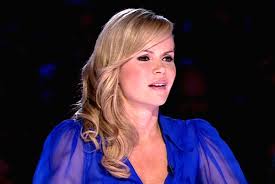 Yesterday saw a strange piece in a UK tabloid about Amanda Holden, a UK celebrity talent show Judge. It contained all sorts of seemingly inexplicable statements, including this about her initial response to her first husband, comedian and actor Les Dennis:
Yesterday saw a strange piece in a UK tabloid about Amanda Holden, a UK celebrity talent show Judge. It contained all sorts of seemingly inexplicable statements, including this about her initial response to her first husband, comedian and actor Les Dennis:
“I thought he was a bit of a miserable sod. The more I got to know him, though, the more he surprised me. At 39, he was almost 16 years older than me. Even so, I felt like he needed mothering. He seemed sad, quiet and troubled, and I instinctively wanted to help.”
How curious is that? Opting to ‘mother’ ‘a bit of a miserable sod’ nearly old enough to be her father, who initially underwhelmed her and sounds more in need of a psychotherapist than he is a naïve, young partner? That sounds suspiciously like being prepared to settle for an uphill relationship that promises to be both hard work, and joyless. Why on earth would you do that?
Then there is the curious statement that Ms Holden has written her autobiography, and is sharing her account of being unfaithful to first husband Dennis with another – less than ideal – partner, so that her children, the older of whom is rising 8, ‘would know the truth’.
It all sounds quite odd, until you read about the time when Les Dennis kicked her leg under the table in a resaurant, and called her a “c***””.
And then it all makes sense. If Amanda Holden is to be believed – and you must assume she most likely is, or she will doubtless end up being very publicly sued by Dennis – her ‘miserable sod’ of a husband was emotionally and physically abusive. Not that she seems to know that being kicked and called filthy names by her husband constitutes domestic violence.
Interestingly, she still doesn’t seem too clear about what the true relationship dynamic. It’s not as if she is unduly charitable about Dennis. Stating that she was the victim of emotional abuse would be accurate, on the strength of what she says, and it would make a lot more sense than does the way she tells the story. She made a dodgy choice of husband. She saw a fair few red flags, which was her intuition telling her not to go there, but she did anyway, and set herself up for years of misery with Dennis.
She made a poor choice of lover, given that he, too, was ‘childlike (by which she proably means childish/infantile/immature) and had a dark side. (Anyone who has had the misfortune of spending time with a childish partner who has a dark side – and that’s just about all emotionally abused women – will know just how unpleasant a combination that turns out to be.)
Emotional abuse would provide a framework for understanding her poor choices.
Holden, clearly, had the emotionally abused woman’s tendency to sell herself short – in her relationships, at least – and settle for a poor second best.
What’s more, she shares the emotionally abused woman’s need to get her story out there, and get people to understand what she’s been through. As I see it, she also shares the emotionally abused woman’s fantasy that if you get your story out there, people will understand and be sympathetic.
Unsurprisingly, the tabloids are fascinated with the sensational aspects of the story, but not unduly bothered about the alleged awfulness of Dennis’s behavior.
Given her celebrity status,if Holden had been able to highlight the characteristic aspects and effects, of emotional abuse her story reveals, it might be useful, and enlightening, for a lot of other women. But she doesn’t. – which leads me – rightly, or wrongly – to assme that she still hasn’t recognised being kicked and abused as what it is: domestic violence.
Unfortunately, there’s nothing glamorous about the popular view of emotional abuse. It’s the rare victim, like Nigella Lawson, who manages to come through it looking like a tragic heroine rather than a silly, weak-minded, hormonal female. As every emotionally abused woman knows to her cost, most people are rather quicker to judge than they re to understand.
Amanda Holden’s story just goes to show, once again, that domestic violence can happen to anyone who is blind to the red flags they see. No matter how attractive, successful, gifted, or otherwise superficially blessed they are.
It happens because there is still not enough awareness of what it is, and what is – and is not – acceptable behavior in intimate relationships.

Annie Kaszina, international Emotional Abuse Recovery specialist and award-winning author of 3 books designed to help women recognise and heal from toxic relationships so that they can build healthy, lasting relationships with the perfect partner for them, blogs about all aspects of abuse, understanding Narcissists and how to avoid them and building strong self-worth. To receive Annie’s blog direct to your Inbox just leave your details here.
The 5 Simple Steps to Healing from Narcissistic Abuse
Over the next 5 days, I'll send you some lessons and tips that I've found have really helped women to heal from narcissistic abuse. Starting with the basics.
